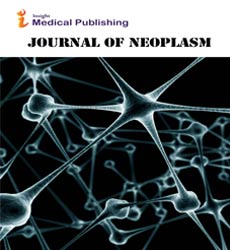Nanotechnology-Based Approaches in Diagnosis and Treatment of Neoplasms
Andreas Stoyanov
Department of Pathology, University of São Paulo (FMUSP), Cerqueira César, São Paulo, Brazil
Published Date: 2025-02-28Andreas Stoyanov*
Department of Pathology, University of São Paulo (FMUSP), Cerqueira César, São Paulo, Brazil
Corresponding author:
Andreas Stoyanov,
Department of Pathology, University of São Paulo (FMUSP), Cerqueira César, São Paulo, Brazil,
E-mail: andreas@stoyanov.br
Citation: Stoyanov A (2025) Nanotechnology-Based Approaches in Diagnosis and Treatment of Neoplasms. J Neoplasm Vol.10 No.1: 003.
Introduction
Nanotechnology has revolutionized biomedical research, offering highly precise tools for the diagnosis and treatment of neoplasms. By exploiting the unique physicochemical properties of nanoparticles, such as their small size, large surface area, and ability to be functionalized with biomolecules, Nano medicine provides innovative strategies for early cancer detection, targeted drug delivery, and enhanced therapeutic efficacy. The integration of nanotechnology into oncology represents a paradigm shift from conventional approaches, aiming to improve diagnostic accuracy, minimize systemic toxicity, and enhance patient outcomes.
Description
In cancer diagnosis, nanotechnology-based approaches have introduced advanced imaging and biomarker detection systems. Nanoparticles such as quantum dots, gold nanoparticles, and magnetic nanostructures enable highly sensitive imaging modalities, including MRI, PET, and fluorescence imaging. These nanomaterials can be conjugated with tumor-specific ligands or antibodies, allowing real-time visualization of neoplastic tissues at the molecular level. Such precision enhances early diagnosis and aids in monitoring tumor progression or therapeutic response, providing a significant advantage over traditional diagnostic methods [1-3]. For treatment, nanoparticle-based drug delivery systems are designed to selectively target tumor cells while sparing healthy tissues. Liposomes, polymeric nanoparticles, and dendrimers encapsulate chemotherapeutic agents, protecting them from premature degradation and ensuring controlled release at the tumor site. The enhanced permeability and retention (EPR) effect in tumors further facilitates the accumulation of nanoparticles in cancerous tissues. Beyond drug delivery, nanotechnology also contributes to advanced therapeutic strategies such as photothermal therapy, photodynamic therapy, and gene delivery. Gold nanoparticles and carbon nanotubes, for example, can convert light or heat into localized energy to destroy tumor cells [4,5].
Conclusion
In conclusion, nanotechnology-based approaches in the diagnosis and treatment of neoplasms offer transformative potential in oncology by providing precise, targeted, and effective solutions. From early detection through advanced imaging to personalized therapeutic strategies, Nano medicine enhances the ability to manage cancer with greater accuracy and reduced side effects. Continued research and clinical translation of these technologies will be crucial in shaping the future of cancer care, paving the way for more effective, patient-centered treatments.
References
- Salvati M, Ciappetta P, Artico M, Raco A, Fortuna A (1991) Intraspinal hemangiopericytoma: Case report and review of the literature. Neurosurg Rev 14: 309-313
Google Scholar Cross Ref Indexed at
- Moscato E, Patronick J, Wade SL (2022) Family Functioning And Adaptation Following Pediatric Brain Tumor: A Systematic Review. Pediatr Blood Cancer 69: e29470
Google Scholar Cross Ref Indexed at
- Lawrance L, McLeroy KR (1986) Self-efficacy and health education. J Sch Health 56: 317-321
Google Scholar Cross Ref Indexed at
- Dix DB, Klassen AF, Papsdorf M, Klaassen RJ, Pritchard S, et al. (2009) Factors affecting the delivery of family-centered care in pediatric oncology. Pediatr Blood Cancer 53: 1079-1085
Google Scholar Cross Ref Indexed at
- Ly S, Runacres F, Poon P (2021) Journey mapping as a novel approach to healthcare: A qualitative mixed methods study in palliative care. BMC Health Serv Res 21: 915
Google Scholar Cross Ref Indexed at

Open Access Journals
- Aquaculture & Veterinary Science
- Chemistry & Chemical Sciences
- Clinical Sciences
- Engineering
- General Science
- Genetics & Molecular Biology
- Health Care & Nursing
- Immunology & Microbiology
- Materials Science
- Mathematics & Physics
- Medical Sciences
- Neurology & Psychiatry
- Oncology & Cancer Science
- Pharmaceutical Sciences
